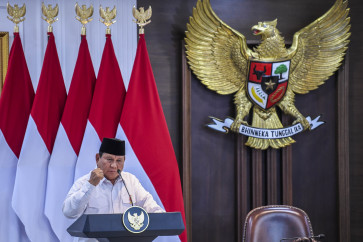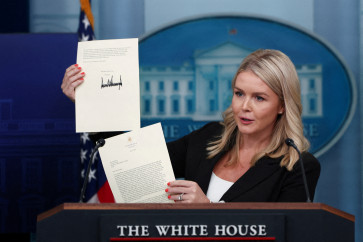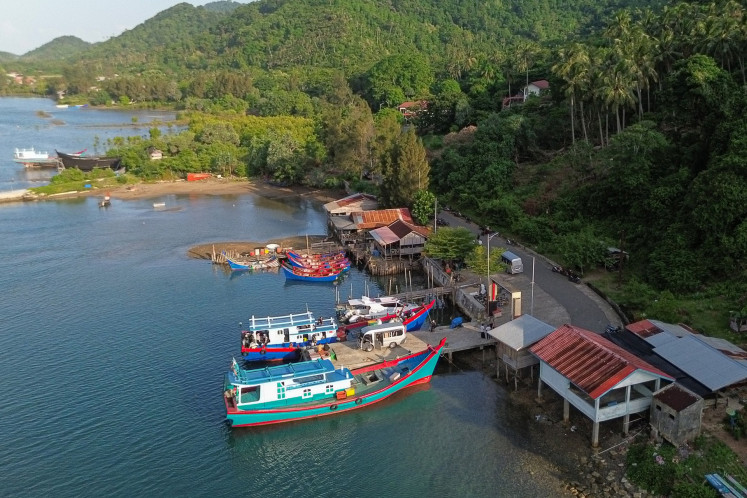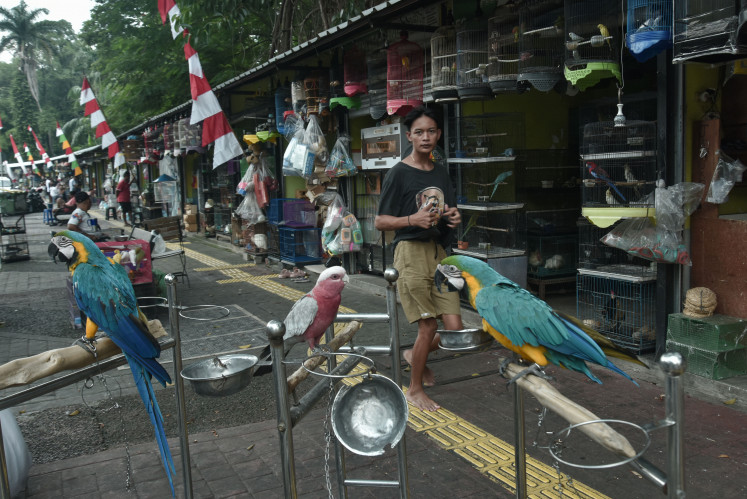Popular Reads
Top Results
Can't find what you're looking for?
View all search resultsPopular Reads
Top Results
Can't find what you're looking for?
View all search resultsEase of doing business through legalization of documents
The several steps for legalization at different institutions can be pooled at a single office to help customers settle their business smoothly.
Change text size
Gift Premium Articles
to Anyone
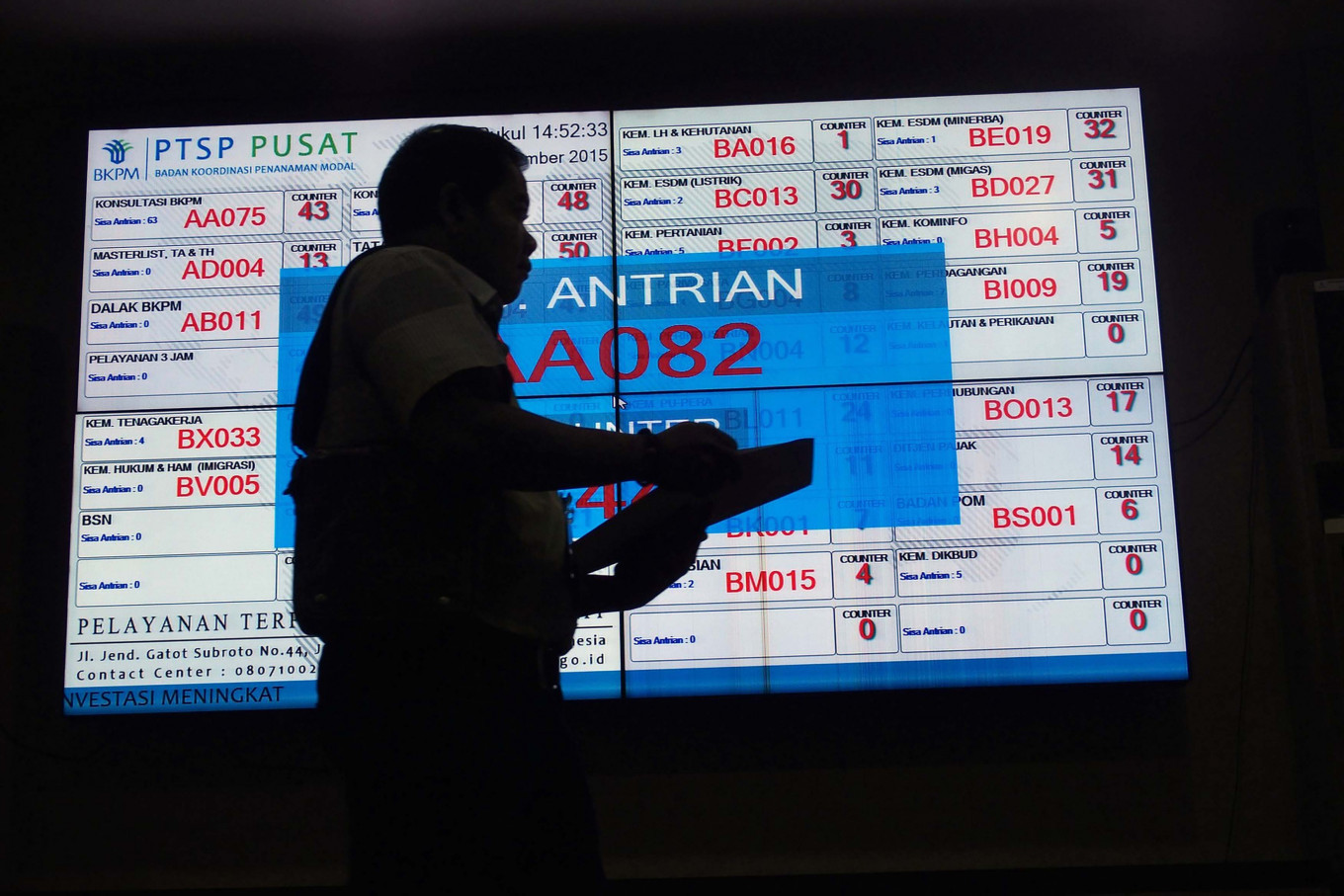 Permission applicants are at the BKPM One-Stop Integrated Service in Jakarta, Tuesday, December 1, 2015. The Investment Coordinating Board (BKPM) continues to perfect its 3-hour investment permit service to provide convenience for investors. After coordinating with the relevant technical ministries, investors who use the 3-hour investment permit service will receive 8 licensing products plus 1 land booking letter (if needed). Licensing products to be given to investors in the 3-hour investment permit service are investment permit, Taxpayer Identification Number (NPWP), Company Establishment Deed and Legalization Decree from the Ministry of Law and Human Rights, Company Registration Certificate (TDP), Foreign Workers Permit, (IMTA), Planned Use of Foreign Workers (RPTKA), Producer Importer Identification Number (API-P), and Customs Identification Number (NIK) . (JP/Ricky Yudhistira)
Permission applicants are at the BKPM One-Stop Integrated Service in Jakarta, Tuesday, December 1, 2015. The Investment Coordinating Board (BKPM) continues to perfect its 3-hour investment permit service to provide convenience for investors. After coordinating with the relevant technical ministries, investors who use the 3-hour investment permit service will receive 8 licensing products plus 1 land booking letter (if needed). Licensing products to be given to investors in the 3-hour investment permit service are investment permit, Taxpayer Identification Number (NPWP), Company Establishment Deed and Legalization Decree from the Ministry of Law and Human Rights, Company Registration Certificate (TDP), Foreign Workers Permit, (IMTA), Planned Use of Foreign Workers (RPTKA), Producer Importer Identification Number (API-P), and Customs Identification Number (NIK) . (JP/Ricky Yudhistira)
T
he government has enacted Law No. 11/2020 on Job Creation, also known as the omnibus law, but it will come into force only after all related government regulations are in place. The law covers wide-ranging areas that were regulated in 77 previous laws, including agriculture, forestry, fishery, industry, education, health, and small and medium enterprises.
In essence, the new law promises three important reforms: It aims to remove unnecessary and complex bureaucratic procedures that pollute the business environment; it rearranges and changes mechanisms deemed relevant; and it annuls provisions that are detrimental to the ease of doing business. This comprehensive law is thus meant to encourage anyone to establish a business while it invites more investment, opens more industries and improves trade, all of which create more jobs.
As regards foreign investment and international trade, various documents from either Indonesia or another country need to be mutually accepted by Indonesian and foreign authorities. The recognition of foreign documents is regulated by the Hague Convention of 5 October 1961 Abolishing the Requirement of Legalisation for Foreign Public Documents, or the Apostille Convention.
Under the Apostille, any document from member states of the Hague Conference on Private International Law (HCCH) or “contracting parties” to the convention can be accepted mutually through a relatively simple procedure that exposes: (a) the authenticity of the signature on the document; (b) the capacity in which the signatory of the document is acting; and (c) the identity of the seal/stamp on the document.
Meanwhile, a document from a non-participating state must be legalized by the appointed authorities. This typically requires four steps: (1) by public notary; (2) by the state’s central authority; (3) by the state’s foreign affairs ministry; and (4) by a representative of the foreign state where the document will be used.
Indonesia is still not a contracting party to the Apostille Convention. Consequently, any Indonesian document intended for use in another state must go through the four steps above. Reciprocally, any document from a non- participating state that will be used in Indonesia must also go through the same four steps.
On the other hand, a document from a state participating in the Apostille that will be used in Indonesia requires legalization by the Indonesian representative in that state. This slow and complicated procedure of legalization will affect every process of transnational business.
The Investment Coordinating Board (BKPM) noticed that Indonesia, like other developing nations, gradually improved its ease of doing business from 120th in 2014 to 91st in 2016, and then to 73rd in 2019 among the 190 countries surveyed. ASEAN neighbor Singapore, meanwhile, has steadily maintained its number one ranking in Asia and number two ranking in the world after New Zealand.
Singapore stays ahead in facilitating business. Its parliament passed the Apostille Bill on Nov. 2, 2020 and started applying the new procedure this month. Any Singaporean document that will be used in another state simply needs to be signed by a public notary and endorsed by the Singapore Academy of Law. The document will then be accepted directly by any party to the Apostille Convention.
On the other hand, any Singaporean document that will be used in non-participating states must be legalized by a foreign representative of the country where the document will be used.
Technically, legalization by a central authority, a foreign ministry and a foreign representative is merely to affirm the signature of the authorized official at each institution, based on the provided specimen. It is clearly stated in the legalization that the authorized official at the legalizing institution is not responsible for the contents of the document.
It is time for Indonesia to consider simplifying cross-border document processes by ratifying the Apostille Convention and joining the 119 parties to the treaty.
While legalization generates a considerable amount of non-tax revenues, the existing process is time-consuming and may increase the costs of producing and using public documents in a foreign state. A long process may affect Indonesia’s competitiveness and ease of doing business.
While waiting to ratify the convention, simplification can start through the One-Stop Service mechanism. The several steps for legalization at different institutions can be pooled at a single office to help customers settle their business smoothly. In this sense, Jakarta has been operating a public service “mall”.
This “mall” offers 328 types of services, comprising 296 services from a variety of agencies and institutions of the Jakarta provincial administration and 32 other services from national ministries and institutions. The opportunity is wide open for shifting legalization services from the central government, including the Law and Human Rights Ministry and the Foreign Ministry.
***
The writer is deputy chief of mission, Indonesian Embassy in Singapore.

